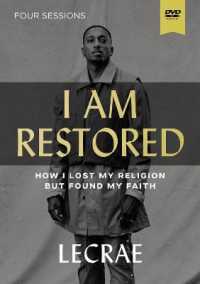- ホーム
- > 洋書
- > 英文書
- > Philosophy
Full Description
In Original Forgiveness, Nicolas de Warren challenges the widespread assumption that forgiveness is always a response to something that has incited it. Rather than considering forgiveness exclusively in terms of an encounter between individuals or groups after injury, he argues that availability for the possibility of forgiveness represents an original forgiveness, an essential condition for the prospect of human relations. De Warren develops this notion of original forgiveness through a reflection on the indispensability of trust for human existence, as well as an examination of the refusal or unavailability to forgive in the aftermath of moral harms.De Warren engages in a critical discussion of philosophical figures, including Martin Heidegger, Hannah Arendt, Mikhail Bakhtin, Edmund Husserl, Gabriel Marcel, Emmanuel Levinas, and Jean AmÉry, and of literary works by William Shakespeare, Fyodor Dostoevsky, Heinrich von Kleist, Simon Wiesenthal, Herman Melville, and Maurice Sendak. He uses this discussion to show that in trusting another person, we must trust in ourselves to remain available to the possibility of forgiveness for those occasions when the other person betrays a trust, without thereby forgiving anything in advance. Original forgiveness is to remain the other person's keeper - even when the other has caused harm. Likewise, being another's keeper calls upon an original beseeching for forgiveness, given the inevitable possibility of blemish or betrayal.
Contents
Acknowledgments
Introduction
1. Upon Trust We Stand, Upon Trust We Fall
2. Forgiveness and the Human Condition
3. The Unforgivable and Forgiving Without Forgiveness
4. The Unforgivable and the Inhuman Condition
5. 'I wonder men dare trust themselves with men': The Forked Significance of Trust
6. 'No cause, no cause': Breakages of Trust and the Availability of Forgiveness
7. The Death of the Other as Murder
8. The Trauma of the Good and the Anarchy of Forgiveness
Afterword
Notes
Index







